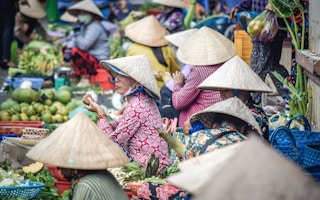As the impacts of Covid-19 have expanded from immediate healthcare needs to our societies and economies, the resiliency and inefficiencies of global, regional and local food systems have the potential to become another major consequence of the pandemic.
To continue reading, subscribe to Eco‑Business.
There's something for everyone. We offer a range of subscription plans.
- Access our stories and receive our Insights Weekly newsletter with the free EB Member plan.
- Unlock unlimited access to our content and archive with EB Circle.
- Publish your content with EB Premium.
The fact that the crisis arrived on the back of a series of good harvests globally has meant that this effect is not as serious as it could have been, and as a result has been limited to more localised issues – such as a shortage of food staples in developed markets, farmers dumping large amounts of produce they have been unable to sell from milk to avocados, disruptions associated with meat processing plants, and localised increases in food pricing.
There is, however, no room for complacency. It is predicted that an additional 135 million people could face acute food insecurity by the end of the year. Frailties in the production and supply of food could be further exacerbated by the potential for weather-related shocks, locust infestations in a number of regions, millions of jobs being impacted across the agricultural value chain, resultant food price spikes and financial losses impacting on hundreds of thousands of small and medium-sized local organisations that are critical to the integrity of food supply chains across the world.
Furthermore, the ongoing impact of Covid-19 on peoples’ livelihoods across all sectors will have an increasingly debilitating effect on their ability to buy healthy and affordable food. This will be particularly felt in underserved communities, where households can spend up to 80 per cent of their income on food, or where hundreds of millions are affected by the school closures that disrupt vital school feeding programmes, which can be a significant – and sometimes the only – source of nutrition for young children. In short, this means the reality of food and nutrition insecurity around the world could soon be on everyone’s plate.
It is critical, therefore, that the private sector, governments, international organisations and civil society come together to address the current and emerging health, economic, environmental and societal crises as they relate to the building of more resilient, healthy, sustainable and equitable food systems. In that respect, three sets of urgent actions are needed.
1. Enhance the resilience and health of existing food systems
- Stabilise access to, affordability and pricing of food for the population, particularly for the most vulnerable with a specific focus on support for women and the young.
- Protect all consumers against lasting damage to their health by ensuring that immediate nutritional needs are met.
- Secure strategic food reserves at country and regional levels.
- Support open borders, green channels and regional food trade to facilitate supply and access to food for all, and enable longer-term investment into the sector.
- Protect the immediate viability of small- and medium-sized businesses (SMEs) throughout the food chain.
2. Enable recovery towards building up of healthy, sustainable, inclusive and efficient future food systems
- Support the inclusion of strengthened food systems that are better placed to deliver healthy and more sustainably produced diets for all, as a critical pillar of national Covid-19 recovery plans and in planned stimulus packages.
- Ensure greater equity of access to healthy diets is embedded more firmly into food system strategies going forward.
- Improve the ongoing technical capacity of the relevant authorities to build resilience against interrelated future shocks to food systems, and address the cross-sector nature of improved food systems management.
- Support entrepreneurship throughout the food and agriculture value chain to advance economic transformation, growth and development amid the pandemic.
3. Promote enablers, including finance, data and digitalisation, and public-private collaboration, as vital in unlocking resilience to and recovery from Covid-19’s impacts on food systems
- Unlock, at scale, finance and de-risking measures to support cash-flow constrained SMEs in the food value chain most impacted by Covid-19.
- Accelerate digital and data readiness through collaboration and by establishing national nerve centres/situation rooms to coordinate food-specific data flows that enable a more informed response to the pandemic.
- Support the call for enhanced connectivity for rural areas, interoperability across information and communications technology (ICT) providers, including unlocking rural ICT access funds, and facilitate the provision to farmers with recognised unique digital identities to support inclusion, access to trusted data flows and the building of efficient farmer databases as we emerge from the crisis.
- Promote cross-sector and cross-stakeholder collaboration to deliver resilient, better nourished, and more prosperous outcomes for all.
The Covid-19 pandemic has exposed the fragility of our food systems, and the extent of our reliance on them to deliver the nutrition we need. With those fragilities now clearly on everyone’s plate, how we come together to build food systems that are inclusive, sustainable, healthy and resilient to a range of shocks is more important than ever.
At the World Economic Forum, we are seeing a renewed commitment to multistakeholder action to solve this challenge – not just for the duration of the pandemic, but for the longer-term transition of food systems that is to come.
Sean de Cleene is a member of the executive committee and head of Future of Food at the World Economic Forum.
Lisa Sweet is head of Future of Protein, COVID Response, and Food-Health at the World Economic Forum.










